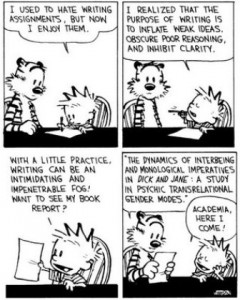The introductory chapter of the Zwiers text highlights the connection between students’ academic language skills and the social and cultural context of their home environment. The text mentions that it is common for teachers to expect a certain level of academic language in the classroom which may not have been explicitly taught in school. Given this, students whose home environments differ drastically from the school environment will be at a disadvantage, namely children of non-mainstream families (e.g. those with English language learner parents). The problematic element of this expectation is that academic language proficiency may often be linked with academic performance; teachers may fall into the habit of grading content based on language abilities. I feel that content and expression should be separately graded, especially if there is a wide range of social, cultural and linguistic backgrounds in the classroom. This separated assessment may allow teachers to distinguish more clearly whether the student is struggling with the content taught or the language necessary to express his or her ideas.
In relation to English (one of my specializations), expression usually plays a decisive role in academic performance at the high school level: those students who communicate in ways other than  a linear, topic-driven fashion will be reprimanded as being “unclear”; however, many cultures express ideas in nonlinear ways, therefore it is important to acknowledge the value of different patterns of expression in different contexts. Like Zwiers points out, it is beneficial to approach teaching academic language as providing another register of expression to the student’s repertoire rather than as teaching to replace. However, it is nonetheless important to guide students in recognizing the appropriate registers in different settings. While acknowledging the student’s own way of expression as legitimate in certain contexts, the teacher may focus on academic language properties that are necessary to express more complex and abstract ideas in formal settings.
a linear, topic-driven fashion will be reprimanded as being “unclear”; however, many cultures express ideas in nonlinear ways, therefore it is important to acknowledge the value of different patterns of expression in different contexts. Like Zwiers points out, it is beneficial to approach teaching academic language as providing another register of expression to the student’s repertoire rather than as teaching to replace. However, it is nonetheless important to guide students in recognizing the appropriate registers in different settings. While acknowledging the student’s own way of expression as legitimate in certain contexts, the teacher may focus on academic language properties that are necessary to express more complex and abstract ideas in formal settings.
Lucy Yang